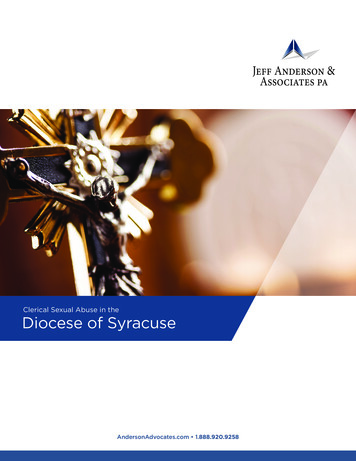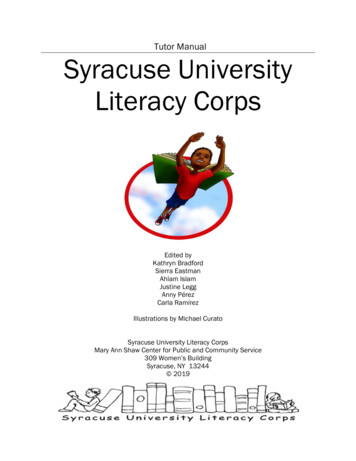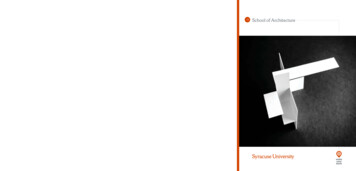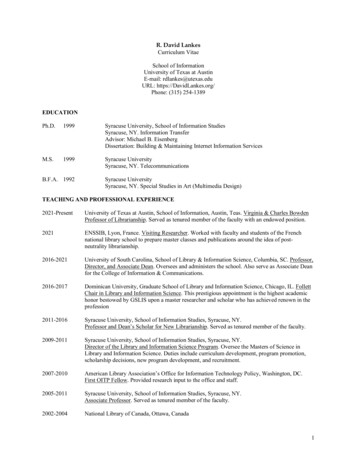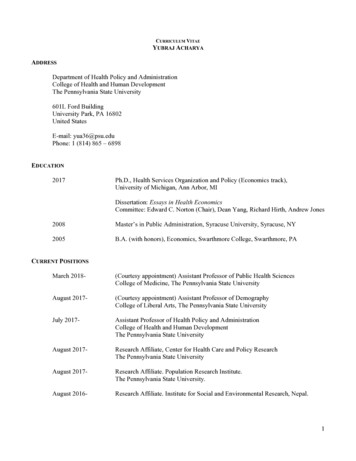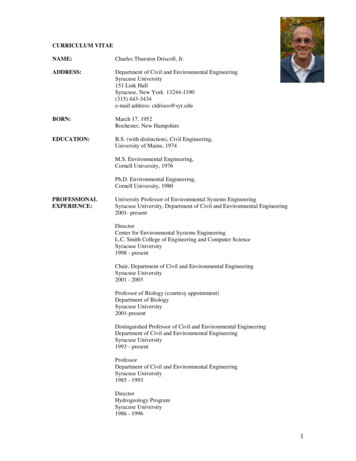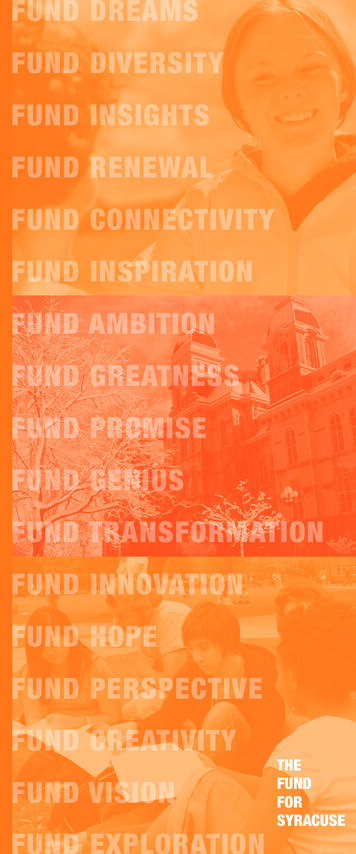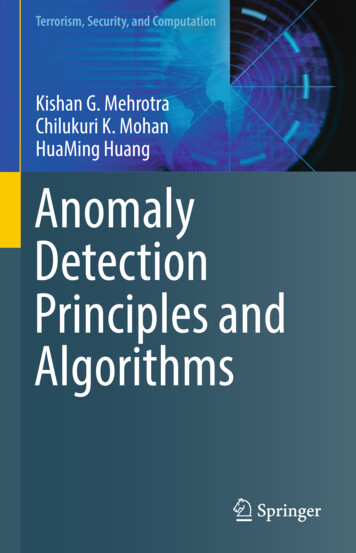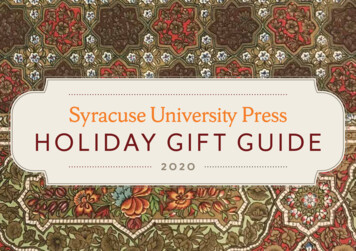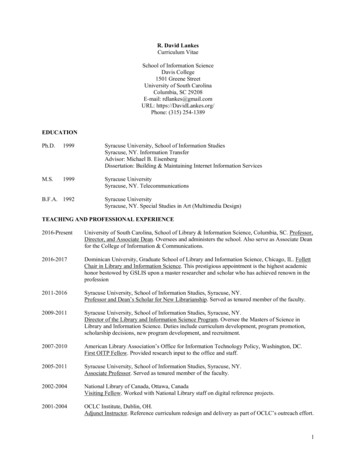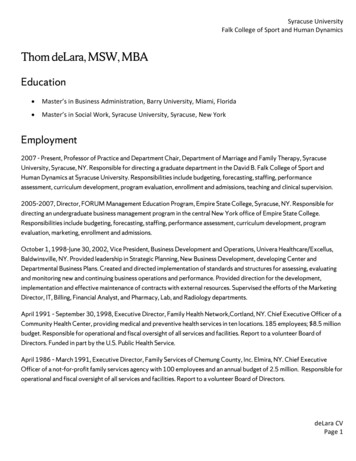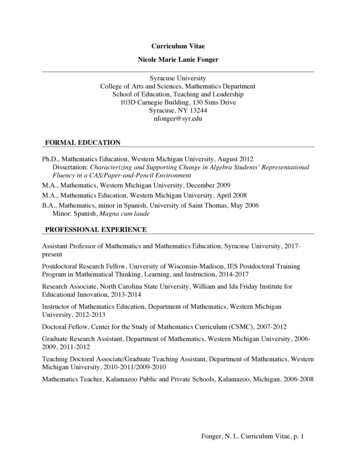
Transcription
Curriculum VitaeNicole Marie Lanie FongerSyracuse UniversityCollege of Arts and Sciences, Mathematics DepartmentSchool of Education, Teaching and Leadership103D Carnegie Building, 130 Sims DriveSyracuse, NY 13244nfonger@syr.eduFORMAL EDUCATIONPh.D., Mathematics Education, Western Michigan University, August 2012Dissertation: Characterizing and Supporting Change in Algebra Students’ RepresentationalFluency in a CAS/Paper-and-Pencil EnvironmentM.A., Mathematics, Western Michigan University, December 2009M.A., Mathematics Education, Western Michigan University, April 2008B.A., Mathematics, minor in Spanish, University of Saint Thomas, May 2006Minor: Spanish, Magna cum laudePROFESSIONAL EXPERIENCEAssistant Professor of Mathematics and Mathematics Education, Syracuse University, 2017presentPostdoctoral Research Fellow, University of Wisconsin-Madison, IES Postdoctoral TrainingProgram in Mathematical Thinking, Learning, and Instruction, 2014-2017Research Associate, North Carolina State University, William and Ida Friday Institute forEducational Innovation, 2013-2014Instructor of Mathematics Education, Department of Mathematics, Western MichiganUniversity, 2012-2013Doctoral Fellow, Center for the Study of Mathematics Curriculum (CSMC), 2007-2012Graduate Research Assistant, Department of Mathematics, Western Michigan University, 20062009, 2011-2012Teaching Doctoral Associate/Graduate Teaching Assistant, Department of Mathematics, WesternMichigan University, 2010-2011/2009-2010Mathematics Teacher, Kalamazoo Public and Private Schools, Kalamazoo, Michigan, 2006-2008Fonger, N. L. Curriculum Vitae, p. 1
AWARDED FUNDINGAwardAmountPersonnel, Project, Sponsoring Agency 5000Fonger, N. L. (PI) and Keech, K. (Collaborator). A Research-PracticePartnership to Enrich and Support Youth Experience of Meaningful Math Learning inan Urban Public High School. Syracuse University, School of EducationAwarded April 30, 2018, Funding Period: 2 years.AWARDSNational Council of Teachers of MathematicsLinking Research and Practice Outstanding Publication Award Mathematics TeacherThe winning article, “Equivalent Expressions Using CAS and Paper-and-Pencil Techniques” wasauthored by Nicole L. Fonger, published May 2014, pp. 688-93.Western Michigan UniversityGraduate Research and Creative Scholar Award, Department of Mathematics, 2011-2012All University Teaching Effectiveness Award, 2010-2011PUBLICATIONSPeer Reviewed Journal ArticlesFonger, N. L., Stephens, A., Blanton, M., Isler, I., Knuth, E., Gardiner, A. (2018). Developing alearning progression for curriculum, instruction, and student learning: An example frommathematics education. Cognition and Instruction, 36(1), 5Fonger, N. L. (2018). A design-based research partnership to support students’ coordination ofcomputer algebra systems and paper-and-pencil. International Journal for Technology inMathematics Education.Fonger, N. L., Davis, J., Rohwer, M. L. (2018). Instructional supports for representationalfluency in solving equations with computer algebra systems and paper-and-pencil. SchoolScience and Mathematics, 118(30), 30-42. doi:10.1111/ssm.12256Stephens, A. C., Fonger, N., Strachota, S., Isler, I., Blanton, M., Knuth, E., Gardiner, A. M.(2017). A learning progression for elementary students’ functional thinking.Mathematical Thinking and Learning, 19(3), 143-166.Fonger, N. L., Reiten, L., Strachota, S., Ozgur, Z. (2017). Engaging in research: Why? How?Now! Mathematics Teacher 110(6), 462-465.Davis, J. D., & Fonger, N. L. (2015). An analytical framework for categorizing the use of CASsymbolic manipulation in textbooks. Educational Studies in Mathematics, 88(2), 239258. doi: 10.1007/s10649-014-9581-zFonger, N. L. Curriculum Vitae, p. 2
Fonger, N. L. (2014). Equivalent expressions using CAS and paper-and-pencil techniques.Mathematics Teacher, 107(9), 688-693.Fonger, N. L. (2012). Shed new light on student thinking with a representational lens.Consortium: The newsletter of the consortium for mathematics and its applications, 102,1-6.Fonger, N. L. (2011). Lessons learned as a novice researcher: The case of a pilot study inmathematics education. The Hilltop Review, 4(2), 55-62. Retrieved October 25, 11/Hiiltop%20Review/Hilltop Review 4.2.2011 Final.pdfHedican, E. B., Kemper, J. T., & Lanie, N. M. (2007). Modeling biomarker dynamics withimplications for the treatment of prostate cancer. Computational and MathematicalMethods in Medicine, 8(2), 77-92.Edited Book ChaptersBlanton, M. Brizuela, B., Stephens, A., Knuth, E., Isler, I., Gardiner, A. M., Stround, R., Fonger,N., Stylinou, D. (2018). Implementing a framework for early algebra. In C. Kieran (Ed.)Teaching and Learning Algebraic Thinking with 5- to 12-Year Olds, ICME-13,Monographs, https://doi.org/10.1007/978-3-319-68351-5 2Hirsch, C., Keller, B., Fonger, N., & Edson, A. (2013). Core Math Tools: Supporting equitableimplementation of the common core state standards for mathematics. In D. Polly (Ed.),Common Core Mathematics Standards and implementing digital technologies (pp. 1-22).Hershey, PA: IGI Global.Ziebarth, S. W., Fonger, N. L., & Kratky, J. L. (2013). Instruments for studying the enactedmathematics curriculum. In D. Thompson & Z. Usiskin (Eds.), Enacted MathematicsCurriculum: A Conceptual Framework and Research Needs (pp. 97-120). InformationAge Publishing.Peer-Reviewed Conference ProceedingsFonger, N. L. (2017). Characterizing sophistication in representational fluency. In Galindo, E.,& Newton, J., (Eds.). (2017). In E. Galindo & J. Newton (Ed.) Proceedings of the 39thannual meeting of the North American Chapter of the International Group for thePsychology of Mathematics Education. Indianapolis, IN: Hoosier Association ofMathematics Teacher Educators.Ellis, A., Fonger, N. L., Dogan, M. F. (2017). Developing function understanding throughdependency relations of change. In Galindo, E., & Newton, J., (Eds.). (2017). In E.Galindo & J. Newton (Ed.) Proceedings of the 39th annual meeting of the NorthAmerican Chapter of the International Group for the Psychology of MathematicsEducation, pp. 283-286. Indianapolis, IN: Hoosier Association of Mathematics TeacherEducators.Fonger, N. L. Curriculum Vitae, p. 3
Fonger, N. L., Dogan, M. F., Ellis, A. (2017). Students’ clusters of concepts of functions. InKaur, B., Ho, W.K., Toh, T.L., & Choy, B.H. (Eds.). Proceedings of the 41st Conferenceof the International Group for the Psychology of Mathematics Education, Vol. 2, pp.329-336. Singapore: PME.Fonger, N. L., Ellis, A., Dogan, M. F. (2016). Students’ conceptions supporting theirsymbolization and meaning of function rules. In M. B. Wood, E. E. Turner, M. Civil, & J.A. Eli (Eds.) Proceedings of the 38th annual meeting of the North American Chapter ofthe International Group for the Psychology of Mathematics Education (pp. 156-163).Tucson, AZ: University of Arizona.Strachota, S., Isler, I., Fonger, N. L., Blanton, M., & Gardiner, A. (2016). Analyzinggeneralizations through discourse. In M. B. Wood, E. E. Turner, M. Civil, & J. A. Eli(Eds.) Proceedings of the 38th annual meeting of the North American Chapter of theInternational Group for the Psychology of Mathematics Education. Tucson, AZ:University of Arizona.Strachota, S., Fonger, N. L., Stephens, A., Blanton, M., Knuth, E., Gardiner, A. (2016).Understanding variation in elementary students’ functional thinking. Proceedings of the40th annual meeting of the International Group for the Psychology of MathematicsEducation.Fonger, N. L., Stephens, A., Blanton, M., Knuth, E. (2015). A learning progressions approach toearly algebra research and practice. In T. G. Bartell, K. N. Bieda, R. T. Putnam, K.Badfield, & H. Dominguez (Eds.). Proceedings of the 37th annual meeting of the NorthAmerican Chapter of the International Group for the Psychology of MathematicsEducation. East Lansing, MI: Michigan State University.Ziols, R., Fonger, N. L., Tran, D. T., Elliott, N. (2015). Children’s reasoning with fractionrepresentation systems. In T. G. Bartell, K. N. Bieda, R. T. Putnam, K. Badfield, & H.Dominguez (Eds.). Proceedings of the 37th annual meeting of the North AmericanChapter of the International Group for the Psychology of Mathematics Education. EastLansing, MI: Michigan State University.Fonger, N. L. (2013). Equivalence and equation solving with multiple tools: Toward aninstructional theory. In M. Martinez & A. Castro Superfine (Eds.), Proceedings of the35th annual meeting of the North American Chapter of the International Group for thePsychology of Mathematics Education (pp. 1141-1148). Chicago, IL: University ofIllinois at Chicago.Fonger, N. L. (2011). An analytic framework for representational fluency: Algebra students'connections between representations using CAS. In L. R. Wiest & T. Lamberg (Eds.),Proceedings of the 33rd Annual Meeting of the North American Chapter of theInternational Group for the Psychology of Mathematics Education. (pp. 88-96). Reno,NV: University of Nevada, Reno. Retrieved mena11/Davis, J. D., & Fonger, N. L. (2010). Computer algebra systems: Their roles and connections topaper-and-pencil skills in reform-oriented curricula. Paper presented at the AnnualFonger, N. L. Curriculum Vitae, p. 4
Meeting of the American Educational Research Association, Denver, CO. Retrieved fromhttp://www.aera.net/repository/Fonger, N. M. L. (2009). CAS-based task frameworks and linking multiple representations. InDj. Kadijevich & R. M. Zbiek (Eds.), Proceedings of the 6th CAME (Computer Algebrain Mathematics Education) Symposium. Belgrade, Serbia. Retrieved fromhttp://www.megatrend.edu.rs/came files/CAME%202009-Proceedings.pdfPolicy ReportStallings, T., Fonger, N., & DeWitt, J. (2014). Recommendations for Moving North CarolinaForward in Digital Learning and Mathematics Instruction. Friday Institute forEducational Innovation, North Carolina State University. March 2014.Opinion EducationFonger, N. L. (2014/2015). Reader reflections: Hexagons reply. Mathematics Teacher, 108(5),325.TEACHING AND MENTORINGGraduate-Level Mathematics Education CoursesSyracuse UniversityLinking Research and Practice (School of Education, EDU 700 / MTD 700, Spring 2018)University of Wisconsin-MadisonSeminar in Research on Mathematics Education (Curriculum and Instruction 942 Fall 2015),Collaborating professor of record: Dr. Amy EllisUndergraduate Mathematics CoursesSyracuse UniversityPrecalculus (Mathematics, MAT 194 Fall 2017)Western Michigan UniversityComputing Technology in Secondary School Mathematics (Math 3510: Fall 2009, Fall 2010,Fall 2012, Spring 2013)Excursions in Mathematics (Math 1140: Summer 2011, Summer 2013)Teacher Preparation Courses (Undergraduate/Master’s Level)Syracuse UniversityMethods and Curriculum in Teaching Mathematics (School of Education, SED 413/613 Fall2017)Candidacy Student Teaching Experience (School of Education, SED 508, Fall 2017)Teaching Assistant: Nigar Atlindas (Fall 2017, SED 413/613)Graduate Student Intern: Joash Mochogi (Fall 2017, SED 413/613)Western Michigan UniversityFonger, N. L. Curriculum Vitae, p. 5
Geometry for Elementary and Middle School Teachers (Math 1510: Spring 2010, Fall 2012,Spring 2013)Number Concepts for Elementary and Middle School Teachers (Math 1500: Spring 2011)High School Courses (Kalamazoo, Michigan Schools)Geometry I & Geometry II (Summer 2006)Algebra I (Shared teaching/Internship) (Fall 2007- Spring 2008)Honors Geometry (Shared teaching/Internship) (Fall 2007- Spring 2008)Graduate Student MentoringSyracuse University Nigar Altindis, Phd Student, Mathematics Education, Research Apprenticeship, Fall 2017 –present.University of Wisconsin-Madison (while a Postdoctoral Research Fellow)Graduate students (related projects, years): Susanne Strachota (LEAP 2: The impact of early algebra on students’ algebra-readiness, 20152016) Fatih Dogan (SPARQ: Supporting Students’ Proof Practices Through Quantitative Reasoningin Algebra, 2014-2016)PROFESSIONAL SERVICEPanel ReviewNational Science Foundation, Ad Hoc Reviewer, 2018.National Science Foundation, Panel Review Member, 2016.National Science Foundation, Panel Review Member, 2015.Peer Review of Journal Manuscripts and Conference ProceedingsJournal of Mathematics Teacher Education, 2017-presentContemporary Issues in Technology and Mathematics Teacher Education (CITE), 2010-present.Journal for Research in Mathematics Education, 2014-present.Mathematics Teacher, 2013-present.North American Chapter of the International Group for the Psychology of MathematicsEducation, 2016-present.8Mentorship and OutreachWomen in Science and Engineering Postdoctoral Faculty Liaison, Syracuse University Collegeof Arts and Sciences, Fall 2017 – presentConference PlanningAssistant to Coordinators, Convening on K-12 Mathematics Education: Common Core, DigitalLearning, and State Policy, March 2014.Fonger, N. L. Curriculum Vitae, p. 6
Local Organizing Committee Member, Psychology of Mathematics Education NorthAmerican Chapter, Western Michigan University, Kalamazoo, MI, Spring 2011 – Fall 2012.Planning Committee Member, CSMC Doctoral Fellows Symposium, San Diego, CA. Fall2009 – Spring 2010.Assistant to Coordinators, Conversations Among Colleagues Conference, Western MichiganUniversity, Kalamazoo, MI, Fall 2007 – Winter 2008.PRESENTATIONSInternational Professional MeetingsFonger, N. L., Dogan, M. F., Ellis, A. (2017). Students’ clusters of concepts of functions. InKaur, B., Ho, W.K., Toh, T.L., & Choy, B.H. (Eds.). Proceedings of the 41st Conferenceof the International Group for the Psychology of Mathematics Education, Vol. 2, pp.329-336. Singapore: PME.Isler, I., Strachota, S, Stephens, A, Fonger, N., Blanton, M., Gardiner, A., Knuth, E. (2017).Grade 6 students’ abilities to represent functional relationships. Presented at the 10thInternational Congress on European Research in Mathematics Education (CERME10).Dublin, Ireland. February 1-5, 2017.Huntley, M. A., Terrell, M., Fonger, N. L. (2016). The algebra content of high school textbooksin the US. Presented at the 13th International Congress on Mathematics Education.Hamburg, Germany. July 24-31, 2016.Fonger, N. L. (2013). Design research. Season School on Design-Based Research. University ofJaén, Jaén, Spain. November 4-8, 2013.Fonger, N. L. & Rohwer, M. L. (2012). Expressions, equations, and equivalence, oh my!TI-Nspire CAS handhelds as a learning tool in algebra. Teachers Teaching withTechnology International Conference. Chicago, IL. March 2012.Fonger, N. M. L. (2009). CAS-based task frameworks and linking multiple representations.Presented virtually at the 6th CAME (Computer Algebra in Mathematics Education)Symposium. Belgrade, Serbia.National Professional MeetingsFonger, N. L. (2018). A self-study on mindfulness in precalculus. Research in UndergraduateMathematics Education (RUME), Pre-calculus working group. San Diego, CA.Fonger, N. L. (2017). Characterizing sophistication in representational fluency. In Galindo, E.,& Newton, J., (Eds.) 39th annual meeting of the North American Chapter of theInternational Group for the Psychology of Mathematics Education. Indianapolis, IN:Hoosier Association of Mathematics Teacher Educators.Ellis, A., Fonger, N. L., Dogan, M. F. (2017). Developing function understanding throughdependency relations of change. In Galindo, E., & Newton, J., (Eds.) 39th annualmeeting of the North American Chapter of the International Group for the Psychology ofFonger, N. L. Curriculum Vitae, p. 7
Mathematics Education. Indianapolis, IN: Hoosier Association of Mathematics TeacherEducators.Fonger, N. L., Stephens, A., Isler, I., Strachota, S. Blanton, M., Knuth, E. (2016). An EarlyAlgebra Learning Progression for Characterizing and Supporting Students’Generalization and Representation of Functions: A Longitudinal Approach to IntegratingCurriculum, Instruction, Assessment, and Student Learning. Institute of EducationSciences Principal Investigators Meeting. Washington, DC. December 2016.#ProjectLEAP advances effective curricular and instructional supports for students’ functional thinking in early algebra#MathEdFonger, N. L., Ellis, A., Dogan, M. F. (2016). Students’ conceptions supporting theirsymbolization and meaning of function rules. 38th annual meeting of the North AmericanChapter of the International Group for the Psychology of Mathematics Education.Tucson, AZ: University of Arizona. November 2016.Stephens, A., Fonger, N. L., Knuth, E., Blanton, M. (2016). Elementary students’ generalizationand representation of functional relationships: A learning progressions approach.American Educational Research Association. Washington, DC. April 2016.Fonger, N. L. (2015). How partnerships are core to a linking research and practice agenda.National Council of Teachers of Mathematics Research Conference. Boston, MA. April2015.Fonger, N. L., Tran, D., Elliott, N. (2015). Variation in Children’s Understanding of Fractions:Preliminary Findings. National Council of Teachers of Mathematics ResearchConference. Boston, MA. April 2015.Fonger, N. L., Tran, D., Elliott, N. (2015). What fraction of children’s knowledge of fractionscan you see? National Council of Teachers of Mathematics Annual Meeting. Boston,MA. April 2015.Fonger, N. L. (2014). Synergy in linking research and practice to support students’ use ofmultiple tools. National Council of Teachers of Mathematics Research Conference. NewOrleans, LA. April 2014.Fonger, N. L. (2014). Conjecturing a linear equations, inequalities, and functions learningtrajectory for teacher education. Association of Mathematics Teacher Educators. Irvine,CA. February 2014.Fonger, N. L. (2013). Equivalence and equation solving with multiple tools: Toward aninstructional theory. 35th Annual Conference of the North American Chapter of theInternational Group for the Psychology of Mathematics Education. The Palmer House,Chicago, IL. November 2013.Fonger, N. L. (2013). A research-based learning progression for beginning algebra. AnnualMeeting of the National Council of Teachers of Mathematics, Denver, CO. April 2013.Fonger, N. L. (2013). Equivalence and equation solving with multiple tools: A learningprogression. National Council of Teachers of Mathematics Research Presession, Denver,Fonger, N. L. Curriculum Vitae, p. 8
Fonger, N. L. (2012). Students’ development of representational fluency with CAS: Aninstructional theory. National Council of Teachers of Mathematics Research Presession.Philadelphia, PA. April 2012.Fonger, N. L. (2011). An analytic framework for representational fluency: Algebra students'connections between representations using CAS. 33rd Annual Meeting of the NorthAmerican Chapter of the International Group for the Psychology of MathematicsEducation. Reno, NV. October 2011.Davis, J. D. & Fonger, N. (2010). Computer algebra systems: Their roles and connections topaper-and-pencil skills in reform-oriented curricula. American Educational ResearchAssociation Annual Meeting. Denver, CO. May 2010.Ziebarth, S. W., Fonger, N. L., & Edson, A. J. (2010). Tools to help teachers and school leadersunderstand curriculum implementation. Annual Meeting of the National Council ofTeachers of Mathematics. San Diego, CA. April 2010.Ziebarth, S., Fonger, N. L., Edson, A., Engelman, J., & Kratky, J. (2010). Pursuing a doctoratein mathematics education: The varieties of research experience. National Council ofTeachers of Mathematics Research Presession. San Diego, CA. April 2010.Invited PresentationsFonger, N. L. (2017). The academic job market. Hosted by the Future Professoriate Program atSyracuse University. Panel Discussion, School of Education. Nov. 30, 2017.Fonger, N. L. (2017). The Tenure-Track Interview Process Luncheon. Hosted by Women inSTEM (WiSE) Postdocs at Syracuse University. Panel Discussion, College of Arts andSciences. Oct. 27, 2017.Fonger, N. L. (2017). Math anxiety: Causes and possible supports through instruction andleadership. Presentation at a Fall meeting of the Math Mavens, Teacher Leaders andMath Coaches of Central New York. Fayetteville Elementary School, Fayetteville, NY.Dec. 8, 2017.Fonger, N. L. (2017). Building bridges to link research and practice. Presentation at the springmeeting for the Tristate Instructors of Mathematics Network. University of WisconsinPlatteville Department of Mathematics, Platteville, WI. April 2017.Fonger, N. L. (2015). Perspectives on Linking Research and Practice: Thoughts From the Field.National Council of Teachers of Mathematics Research Conference, Boston, MA. April2015.Kemper, J. T. Hedican, E. B., & Lanie, N. (2004). Prostate specific antigen as bio-marker forprostate cancer. Invited presentation for the Center for Applied Mathematics, MathAppreciation Day, University of Saint Thomas, Saint Paul, MN. November 2004.Other Presentations, Posters, and ColloquiaFonger, N. L., Mayer, J., Huntley, M. A., Terrell, M. (2017). Engaging in research. Why? How?Now! A teacher-researcher partnership. Presented at the Association of MathematicsTeachers in New York State (AMTNYS), Nov. 2017. Buffalo, NY.Fonger, N. L. Curriculum Vitae, p. 9
Stephens, A., Blanton, M., Demers, L., Knuth, E., Stylianou, D. Burrows, A., Eiland, M.,Fonger, N. L., Gardiner, A. M., Hayes, R., Isler, I., Kang, H., Strachota, S. (2016).Project LEAP: Learning through an early algebra intervention. University of WisconsinMadison Education Research Poster Fair. February, 2016.Fonger, N. L. (2015). A learning progressions approach to supporting algebra students’representational fluency in equation solving. Poster presented at 3rd Annual Meeting onMathematical Thinking (M3T-3). University of Minnesota. August 14, 2015.Fonger, N. L., Davis, J. D., Rohwer, M. L. (2015). A functions approach to solving equationswith computer algebra systems/paper-and-pencil: Supports for students’ change inrepresentational fluency. Poster presented at Social Policy and Research in Cognition &Mathematics Education: A focus on Common Core (SPaRCME). University ofCalifornia, Berkeley. May 29-30, 2015.Blanton, M., Demers, L., Knuth, E., Stephens, A., Stylianou, D. Burrows, A., Eiland, M.,Fonger, N. L., Gardiner, A. M., Hayes, R., Isler, I., Kang, H., Strachota, S. (2015).Project LEAP: Learning through an early algebra intervention. University of WisconsinMadison Education Research Poster Fair. February, 2015.Blanton, M., Knuth, E., Stephens, A., Eiland, M., Fonger, N. L., Gardiner, A. M., Hayes, R.,Isler, I., Kang, H., Strachota, S. (2015). The impact of early algebra on students’ algebrareadiness. University of Wisconsin-Madison Education Research Poster Fair. February,2015.Fonger, N. L. (2015). How partnerships are Core to a linking research and practice agenda.Mathematics Education Seminar, University of Wisconsin-Madison. February, 2015.Fonger, N. L. (2014). Advancing a program of research. Mathematics Education Seminar,University of Wisconsin-Madison. October, 2014.Fonger, N. L., Maloney, A. M., Confrey, J. (2013). Three musketeers of algebra. North CarolinaCouncil of Teachers of Mathematics 43rd Annual Conference. Joseph S. KouryConvention Center, Greesboro, NC. October 2013.Fonger, N. L. (2013). The strategic use of paper-and-pencil and CAS: Reconciling differencesbetween representations. Conversations Among Colleagues, Central Michigan University,Mount Pleasant, MI. March 2013.Fonger, N. L. (2012). Visualize shape center and spread with Core Math Tools. Annual Meetingof the National Council of Teachers of Mathematics BuzzHub. Philadelphia, PA. April2012.Hirsch, C. & Fonger, N. (2012). Core Math Tools supporting CCSSM-oriented curriculumdesign and enactment. Center for the Study of Mathematics Curriculum ResearchConference. Phoenix, AZ. March 2012.Fonger, N. (2012). Algebra students’ representational fluency in a CAS and paper-and-pencilenvironment. Center for the Study of Mathematics Curriculum Research Conference.Phoenix, AZ. March 2012.Fonger, N. L. Curriculum Vitae, p. 10
Fonger, N. L. (2011). How dynamic links can bolster connections between representations.Michigan Council of Teachers of Mathematics Annual Conference. Macomb, MI. August2011.Fonger, N. & Davis, J. (2010). The role of computer algebra systems in high school curricula: Atextbook analysis. Poster presentation at the Fourth Annual WMU Research and CreativeActivities Poster Day, Western Michigan University, Kalamazoo, MI. April 2010.Ziebarth, S. Fonger, N. L., & Edson, A. J. (2009). Fidelity of implementation tools: High schoolcurricula. Poster presentation at the Center for the Study of Mathematics CurriculumResearch Conference. Phoenix, AZ. February 2009.Fonger, N. L., Edson, A. J., & Ziebarth, S. (2009). Fidelity of implementation tools: High schoolcurricula. Poster presentation at the Third Annual WMU Research and Creative ActivitiesPoster Day, Western Michigan University, Kalamazoo, MI. April 2009.Fonger, N. L. (2009). Technology-intensive curricula and student learning. Center for the Studyof Mathematics Curriculum Research Conference. Phoenix, AZ. February 2009.Lanie, N. (2008). Delving deeper into CPMP-Tools: Java-based software for data analysis andprobability simulation. Poster presentation at the Center for the Study of MathematicsCurriculum Research Conference. Phoenix, AZ. February 2008.Lanie, N. (2008). New software tools supporting new expectations for high school mathematics.Workshop presentation at the Mathematics in Action Conference. Grand Valley StateUniversity, Grand Valley, MI. February 2008.Lanie, N. (2007). Interactive geometry software for all Michigan teachers and students.Workshop presentation at Michigan Council of Teachers of Mathematics AnnualConference. Holt, MI. August 2007.Lanie, N. & Hirsch, C. (2007). Design and development of curriculum-embedded, Java-basedsoftware for high school mathematics. Poster presentation at the Center for the Study ofMathematics Curriculum Research Conference. Phoenix, AZ. February 2007.Lanie, N. & Thompson, A. (2006). GEMS Camp at UST: Girls experiencing math in thesummer. Presentation at the Minnesota Council of Teachers of Mathematics AnnualConference. Duluth, MN. April 2006.Rezac, L. & Lanie, N. (2005). Arabesque: Studying geometry in Spain. Presentation at theMinnesota Council of Teachers of Mathematics Annual Conference. Duluth, MN. April2005.Lanie, N. (2005). Symmetry in southern Spain: Classification of 17 planar symmetry groups.Presentation at the Minnesota Council of Teachers of Mathematics Conference. AndoverMN. October 2005.Lanie, N. (2005). GEMS camp: Counseling girls in mathematics. Presentation at the MinnesotaCouncil of Teachers of Mathematics Conference. Andover MN. October 2005.Rezac, L. & Lanie, N. (2004). Classification and proof of 17 planar symmetries. Posterpresentation at University of Saint Thomas, Saint Paul, MN. September 2004.Fonger, N. L. Curriculum Vitae, p. 11
LEADERSHIP TRAININGUndergraduate research mentor training, DELTA program, University of Wisconsin-Madison,May 2016.Postdoctoral Training Course in Scientific Leadership & Management, University of WisconsinMadison, School of Medicine and Public Health, October 2015 - March 2016.Conflict Management Training, North Carolina State University, April 2014.PROFESSIONAL DEVELOPMENT FOR TEACHERSCourse Developer, MOOC-Ed Series Course on Fractions Foundations. Fall 2014. www.mooced.orgCourse Developer and Leader, MOOC-Ed Series Course on Mathematics LearningTrajectories, Equipartitioning as a Foundation for Rational Number Reasoning in K-5. Onlineweb platform October 7 – November 26, 2013. www.mooc-ed.orgWorkshop Developer and Leader, Deep Understanding of Geometry, Michigan MathematicsRural Area Project workshop for elementary teachers. Gaylord, MI, June 26 – 28, 2013RESEARCH & DEVELOPMENT EXPERIENCEPostdoctoral Research Fellow for the U.S. Department of Education—IES TrainingProgram in the Education Sciences under grant no: R305B130007, and as part of theWisconsin Center for Education Research Postdoctoral Training Program in MathematicalThinking, Learning, and Instruction, and the University of Wisconsin-Madison. Drs.Mitchell Nathan (Project Director), Amy Ellis, Eric Knuth (Faculty Mentors). Duties includeconducting and leading research on learning trajectories/progressions, students’ conceptions ofquadratic functions, generalization, and representational fluency in CAS and paper-and-pencillearning environments. Project work: SPARQ: Supporting Students’ Proof Practices Through Quantitative Reasoning in Algebra,NSF Career Grant (Award #0952415), led by PI Dr. Amy Ellis, July 2014 – present. LEAP 3: The impact of a teacher-led early algebra intervention on children’s algebrareadiness for middle school, IES Math and Science Education, Goal 3: Efficacy andReplication project, led by PIs: Drs. Maria Blanton, Despina Stylianou, Eric Knuth, AnaStephens, and Lindsay Demers (Award # R305A140092), July 2014 – Aug. 2017. LEAP 2: Collaborative Research: The impact of early algebra on students’ algebra-readiness,NSF DRK-12, led by PIs: Drs. Maria Blanton, Eric Knuth, and Ana Stephens (Award #1219606), July 2014 – Aug. 2017. GAMMA: Generalization Across Multiple Mathematical Areas, NSF EHR Core ResearchGrant, led by PI Dr. Amy Ellis with CoPIs: Elise Lockwood, Erik Tillema, and Kevin Moore.July 2015 – February 2016. AVATAR: Connecting Mathematical Ideas through Animated Multimodel Instruction, IES,Mitch Nathan (Co-PI), Collaborators: Martha Alibali (UW-Madison), Voicu Poescu(Purdue), Nicolette Adamo-Villani (Purdue), Susan Cook (U Iowa). April – July 2015.Fonger, N. L. Curriculum Vitae, p. 12
Professional Consultant on Examining Different Curricular Approaches and Their Impacton High-School Students' Understanding of Algebra: Phase 1 - Studying the IntendedCurriculum (NSF Grant 0901311). Dr. Mary Ann Huntley (Cornell U), PI, Collaborators: Dr.Maria Terrell (Cornell U), Jennifer Mayer, Dick
Curriculum Vitae Nicole Marie Lanie Fonger . Syracuse University College of Arts and Sciences, Mathematics Department School of Education, Teaching and Leadership 103D Carnegie Building, 130 Sims Drive Syracuse, NY 13244 nfonger@syr.edu . FORMAL EDUCATION . Ph.D., Mathematics Education, Western Michigan University, August 2012 Dissertation:
